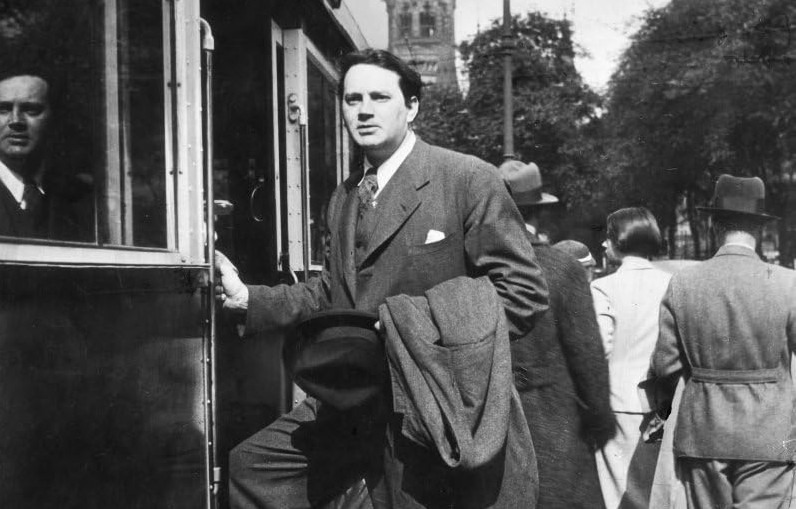Large-framed, with gargantuan tastes, the North Carolina-born writer Thomas Clayton Wolfe (Oct 3, 1900-Sept 15, 1938) spent his last lucid weeks in the State of Washington.
Author of “Of Time and the River, “Look Homeward, Angel,” and other examples of the most descriptive prose in our time, Wolfe toured the Western National Parks in June of 1938 in the back seat of a Ford sedan as he entered Washington State.
Writing in his journal, Wolfe described the pines and larches of the country north of Spokane. At Spokane’s upscale Davenport Hotel he found a bottle of scotch, slept well and then headed toward what he called “The basil ramparts” of Grand Coulee Dam (still under construction). Wind buffeted the car in the fertile Yakima Valley. He turned to follow the American River and described Chinook Pass with “mist more thick than leaden fog.”
At the state capitol, Olympia, he ate a shrimp cocktail and pan roast of tiny succulent Puget Sound oysters spread on toast. Leaving the Ford behind, he boarded a bus for Seattle. His first glimpse of the great Puget Sound city was described as follows: “Flying field, viaducts – the settlements upon the hills, then the railway stations and the full town, the downtown section, “big house,” the crowded streets, the long pull up the slope of Second Avenue, the bus station . . . ” Here, Wolfe’s staccato diary ends, but dramatic weeks lay ahead.
With only a night’s sleep he boarded the Vancouver, B.C. – bound Canadian Pacific steamship “Princess Kathleen.” Gregarious, enthusiastic, he met a number of shipmates and shared a bottle of whiskey on the cold deck with, in his words, “a poor shivering wretch.” By the next day Wolfe had chills, fever, and chest pains. A few hours later, returning to Seattle by train, he asked the porter to wrap him in a blanket.
Seattle author James Stevens and his wife Theresa tried to look after him, even calling a doctor. Despite his near incapacitation, Wolfe attended a party with University of Washington faculty, eating, drinking and talking at full tilt. Stevens contacted a respiratory specialist they knew at Firlawns Sanitarium near Kenmore. Protesting all the way, Wolfe nevertheless underwent treatment for pneumonia. After his temperature dropped from 105 degrees to 100 he showed signs of recovery. Suddenly, his condition worsened. While undergoing tests at Seattle’s Providence Hospital, one of his doctors suggested that he might have tuberculosis.
Wolfe went into a rage. Curiously, he then wrote what would be the last letter of his life to his editor and friend, Maxwell Perkins. In part, Wolfe wrote: “I’ve made a long voyage and been to a strange country, and I’ve seen the Dark Man very close; and I don’t think I was too much afraid of him . . .” He ended his short note reminiscing about the time three years before when he and Perkins had gone to the top of a Manhattan skyscraper, “and all the strangeness and the glory and the power of life and the city was below.”
Still convalescing in September, Wolfe was angry at everyone. He was, in short, very frightened. Headaches began and his temperature would not subside. Wolfe’s sister and brother were now in Seattle. Soon Wolfe began raving, losing track of time, forgetting names.
Wolfe’s doctors suggested that he leave immediately by train for Baltimore and the care of noted brain surgeons at Johns Hopkins. After an anxious three-day rail trip and more hospital tests, Thomas Wolfe died on September 15, 1938, of tuberculosis of the brain.
In Asheville, North Carolina, Wolfe’s tombstone includes a line from “Look Homeward, Angel: “The Last Voyage, the Longest, the Best.” In his Western Journal is a hurriedly scratched note written at Sunrise Lodge at Mt. Rainier on July 2nd, 1938, 45 days before Thomas Wolfe died: “It was immense and terrific and near and a cloud still clung to the Great Cloudmaker.”
Discover more from Post Alley
Subscribe to get the latest posts sent to your email.

Hi Junius,
Another illuminating glimpse of the past. Love his note on Mt. Rainier.
I’ve never read Wolfe – just put Look Homeward Angel and Of Time and the River on my list.